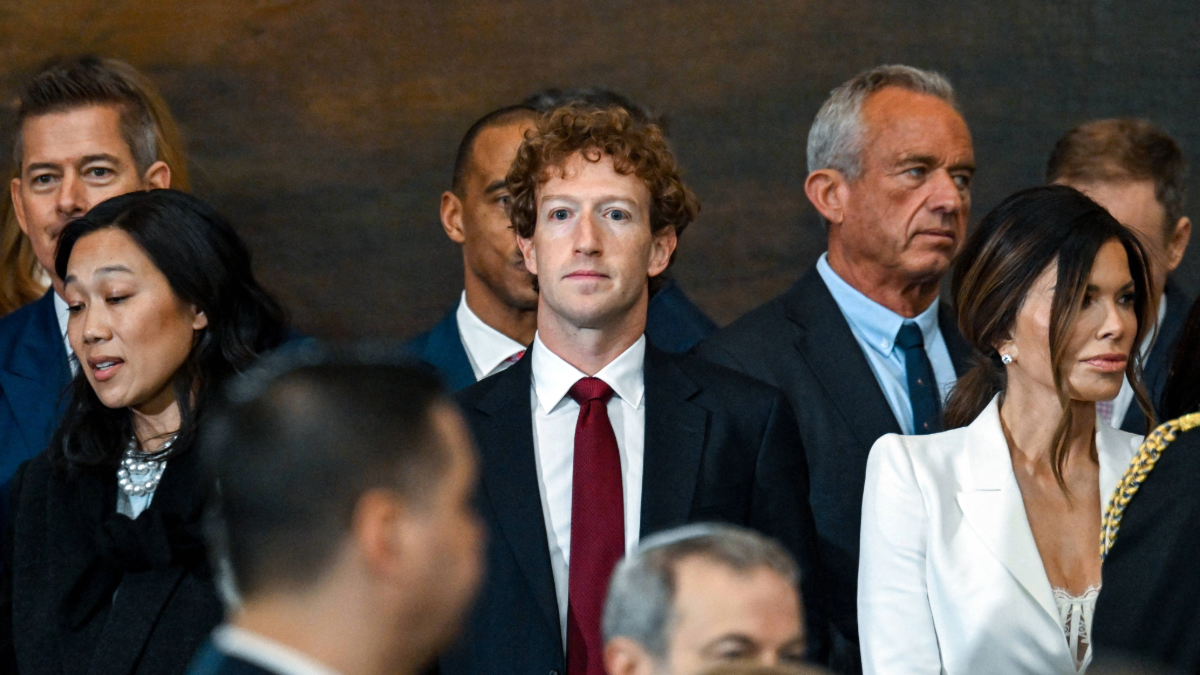Why Meta’s FTC Trial Matters for Keeping Young People Safe Online
Zamaan Qureshi / Apr 15, 2025
Meta founder and CEO Mark Zuckerberg attends the inauguration ceremony where Donald Trump was sworn in as the 47th US President in the US Capitol Rotunda in Washington, DC, on January 20, 2025. (Photo by KENNY HOLSTON/POOL/AFP via Getty Images)
On Monday, Meta founder and CEO Mark Zuckerberg took the stand in a Washington, DC, courthouse to defend his company’s acquisitions of Instagram and WhatsApp. The case, first brought by the Federal Trade Commission in 2020, presents important questions related to competition and antitrust law and regulation. It is also a unique moment in the fight to make social media companies safer for young people. The company has failed to protect my generation online, and that’s because it has gotten too big to care. The remedies that could stem from this trial, including the potential for a breakup of Meta, represent one of the most important ways we can protect the next generation of young people on social media.
Instagram, used by approximately 61% of US teenagers, has been at the center of the evidence that three different whistleblowers have come forward to share details about Meta’s knowledge of its products’ deleterious impacts on minors. And over 40 state attorneys general have brought a lawsuit against the company. Meanwhile, Congress has failed to deliver on legislative reforms such as the Kids Online Safety Act, and the tech industry routinely attempts to block state-level design protections. As a result, my generation is entirely exposed as legally compelled protections are continuously delayed. Breaking off Instagram from Meta would restore much-needed competition to a tech sector that, at present, shrugs off the backlash against its practices in exchange for cornering the market of young people.
They monopolized our attention
When I asked a room full of Berkeley students last week how many of them grew up on apps such as Instagram, Snapchat, and YouTube, almost every hand in the room shot up. This aligns with data that suggest competition for young people’s attention is not fierce–it’s been entirely conquered.
Social media platforms have voraciously carved out specific slices of our attention. Each has identified and conquered a different component of our daily routines. This has enabled these companies to dominate key functions of our experiences online, bloating to monopolistic proportions. Instagram is where we go for a carefully curated representation of our personality through multimedia content grids. Snapchat is for our private exchanges, for the messages we want to disappear quickly. TikTok is the hyperactive successor to TV, where we go for mindless entertainment (and endless hits of dopamine), while YouTube offers long-form video for more sustained viewing sessions.
In other words, each app controls its own corner of the attention economy. We don’t go to YouTube to connect with friends or Instagram to watch long-form content. Instead, each app has its own place on the daily roster of young people’s digital consumption. With such a cornered market, there’s little incentive for Instagram to compete for attention when they know it is guaranteed. This is especially significant given that Meta’s own 2019 “Teen Mental Health” study found “teens can’t switch off from Instagram even if they want to.” It’s a toxic relationship. As the FTC will argue, “Facebook’s ability to harm users by decreasing product quality without losing significant user engagement, indicates that Facebook has market power.”
But what’s much scarier is the callousness with which Meta responds to concerns: Its answers to Congress become increasingly vague, more misleading, or downright dishonest. Instead of critically addressing the concerns raised by evidence that whistleblowers have brought forward about Instagram, the company has instead sought to discredit the individuals who have credibly exposed Meta’s negligence.
When Facebook was competing with Instagram in the early 2010s, Instagram spooked Facebook when it courted younger audiences. As business writer Nicholas Carlson noted at the time, Instagram “allows people to do what they like to do on Facebook easier and faster.” Rather than out-innovate or improve its own product, Facebook acquired Instagram for $1 billion–pennies compared to the goliath that Meta is today. Regulators overlooked competition concerns at the time, even stating the two companies weren’t competitors.
Toxic relationships must end with breakups
Today, Instagram dominates. It shamelessly adds successful features developed by other industry players, like Reels (from TikTok) or stories (from Snapchat). But suggest to any young person that Reels are better than TikToks, and they’ll laugh in your face. At the same time, Meta seems to have a gross disregard for the very user base it has profitably cornered.
Young people are locked in a vicious relationship with Instagram. On the one hand, it offers community and a place to share exciting experiences, moments, and ideas. On the other hand, it addicts, facilitates eating disorders, connects predators to children, and gobbles up endless amounts of data. If we could control it, increasing numbers of young people would prefer the platform never existed—but in our present reality, leaving the platform too often means social ostracization.
A breakup might sound scary. Meta and its proxies will likely tell you that it will cease to be able to run its products. But what if, instead, it was a win-win for everyone? I am certainly not suggesting that all of Instagram's problems would go away if it were spun off. In fact, we must continue to advocate for stronger kids’ online safety, competition, and privacy laws, push strategic litigation, and speak out about the harms we are witnessing.
But if a federal Judge forces Instagram to spin off from Meta, it would relinquish its attachment to its parent company’s endless troves of data, PR machine, and lobbying dominance. This new competition could force the company(s) to contend with the realities of creating a product marketed primarily for teenagers. Perhaps it will allow the company to build corporate accountability measures and governance structures that actually hold its leadership accountable. Maybe it will have to finally treat its user base as humans, not dollar valuations.
An optimistic view would suggest that even some intervention to restore healthy competition in the market might lead to new innovative solutions for combating some of the thorniest issues on social media. With competition, Instagram will be forced to address its problems without the shield of a “too big to do harm” mentality. It’s possible that Instagram would take on a new set of competitors—apps we may not even be familiar with—that could force the company to make a better product that maximizes the value that brought young people there in the first place.
If the FTC is successful in arguing its case that, for example, “Meta’s degradations of quality without losing a prohibitive number of users” is evidence of illegally maintained monopoly power, then perhaps young people are in for a breakup they wouldn’t mind being on the receiving end of.
Authors
